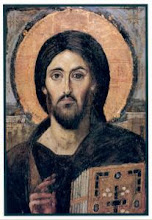Thursday, September 13, 2012
The Lord is My Banner!
The Lord is my banner! As Joshua prepared to cross the
Jordan River he knew that he was terribly out numbered by the inhabitants of
the Promised Land. His spies even reported that there were giants! The
Israelites trembled but God was faithful. He chose Joshua, a man of great faith
and courage to lead his people into the “Land of Milk and Honey.” When faced
with doubters, Joshua told the people to do what they wanted “but as for he and
his house they would trust and have faith in the Lord.” He knew that the Lord
was his banner. He knew that the Lord would go before the people and defeat
their enemies. The Lord was their banner!
We often face situations in life that are daunting and
overwhelming, causing us to live in fear. We often stand at the rivers edge of
this life and simply freeze, afraid to move forward. What if we fail? What if
we are unworthy? What if we experience defeat? What if we drown in a river of
despair? What if we fall flat on our faces? What if… The list goes on and on.
Like Joshua it is important for us to remember that the Lord
is our banner. God goes before us and we are called to follow in faith. Yet
faith doesn’t just happen. As James tells us “Faith without works is dead.”
This doesn’t necessarily mean physical activity, but spiritual as well. To have
faith we must go to God in prayer on a regular basis and cultivate a trusting
relationship with God. Joshua had such a spiritual relationship with the
Father. Where there was indecisiveness amongst the Hebrew people, Joshua was
certain through prayer and faith that God would allow the Israelites to prevail
against those they faced in the Promised Land. Joshua knew that God was his
banner.
My question for us is simple: Is the Lord our banner? Do we
trust him enough to allow God to go before us so that we might follow no matter
what difficult odds we face in this life? “As for me and my house we will trust
in the Lord.”
Tuesday, September 11, 2012
Avoiding Toxicity
Nothing rots and corrodes a parish like toxicity. What is
toxicity? It is when there are divisive and control issues within the church.
Sometimes the priest, sometimes the laity and sometimes both express these
traits. Nevertheless, toxicity is detrimental to the life and wellbeing of the
parish.
Toxicity is contagious and creates a bitter ailment that can
spread through the parish like wildfire if left unchecked. That is exactly what
Satan wants to take place. The nature of sin is to divide and when the devil
creates division and “sides” he inflicts a wretched wound into the Body we call
the Church.
How do we avoid such a terrible situation? How do we live a
life that is mutually healthy for the clergy as well as the laity? How do we
learn to live with our differences? The answers are really quit simple although
many times challenging to do.
These are the traits of a healthy parish: We work together
in a mutual and loving manner. We talk and communicate with each other, and
treat each person with dignity, civility and respect. We avoid triangulation.
We become honest with one another in love and affection, rather than through
venomous gossip or the ugly need to be in control (get our way at all costs!).
We have to remember that we are One Body in Christ Jesus.
When one part of the Body is sick, it makes the whole Body ill. We want to
attend to those areas of pain and suffering, validate them and then address the
illness directly. Occasionally this healthy method of dealing with conflict
comes at a cost. Perhaps we lose a parishioner or a family. While that is the
last thing we want to occur, sometimes its best for the layperson or even the
clergy member to move on to another place, but before they leave we strive for
reconciliation; otherwise we take the baggage from one place directly into
another.
The Apostle Paul was constantly battling toxicity. He wanted
to eradicate it through mutual love and unity in Christ. It hurt him bitterly deep to witness division
and disunity. He became an ongoing target of abuse and slander in some areas,
but that didn’t matter to him. He was willing to give his very life for his
love of the church. He wanted her whole and striving to live as One in Christ.
Can we as a church live as one? Can we avoid the devastating
effects of toxicity? Can we feel safe in our church environment? Are we willing
to let go of our own wants and needs and embrace our neighbor in love, whether
we agree with them or not?
The answer to these questions lie within our spirits and
willingness to live as wholesome examples in Christ. It’s up to us to model
healthy behavior to the world and keep our focus on what is truly important –
the Good News of Jesus Christ!
Monday, September 10, 2012
Sunday, September 9, 2012
Ephphatha - Be Open!
Pentecost
15
Proper
18
Year
B
Mark
7:24-37
September
9, 2012
“Ephphatha! —Open
up!” This is the word that Jesus said to the deaf and mute man in this mornings
Gospel. He opened the mans ears to hear and his mouth to speak. This is a truly
amazing miracle. Open up! I can’t get that word out of my mind – Ephphatha!
What if we as a church were to all (universally) open up? What if we as a
church blew the doors off their hinges and invited every single person we
encountered into our midst. What if we like Jesus listened to the Syrophoenician woman? What if we invited all of
the tax collectors, prostitutes, lepers, and outcasts into our very midst? What
would this church look like? What would any church and every church look like?
To open up is frightening.
When I was in
seminary I’ll never forget the first time that I knowingly was hugged by a
young man with AIDS. I was terrified that I had opened myself up to that awful
disease. Yet I hugged the man anyway. I stood at the point of Ephphatha. I
could either remain closed and walk away or I could open up and receive the
mans embrace. Years later I was able to be open to a young man and hold him
while he died of the same wretched disease. Because I listened to Christ I was
open and unafraid. The listening and trusting the voice of the Holy Spirit is
important.
Jesus tells us (like
the man he healed) to “open up!” Notice he opened the mans ears to hear before
he released his tongue to speak. Perhaps it is wise to listen to the voice of
the Holy Spirit before we speak, before we act and before we judge. The more we
listen the more we hear. The more we hear the less we speak. The less we speak
the more we listen to the needs of the other, and not our own chatter about our
wants. That is what Christianity is about. It is about listening to those in
need such as the syrophoenician woman and the deaf, mute man and opening up our
own ears to listen to their needs and then respond to their needs through not
only our speech, but actions as well.
Opening up is
risky! It means we have to listen to those we disagree or are prejudice towards.
It means we have to speak the Gospel message to them as well as those we are
close too. To open up is scary! Like the man in today’s Gospel it transforms
our lives.
I have two
friends who will not come to church. They are both deaf to God and are
literally terrified that I might try and preach to them. What if their hearts
were to open up? What if their lives could be transformed so that they couldn’t
stop talking about the love of Christ? (That would be a true miracle!) But it
is scary for me because if I open up to them about Christ, I risk losing them
as my friends. Yet Jesus says – Ephphatha!
Jesus took a big
risk opening up to the syrophoenician woman. After all she was a gentile and a
woman. In Christ’s day and time speaking to her as a good Jewish person would
have been scandalous. Yet Jesus set aside prejudice in order to (seemly and
reluctantly) help this woman by curing her daughter. He made himself vulnerable
to her needs.
When we open up
we make ourselves vulnerable to the needs of others. We open ourselves up to
risk – perhaps the risk of losing friends; the risk of losing our reputations
(there goes another one of those ‘Bible Thumpers’); the risk of losing our
place in society. If we blow the doors off the church and invite in all the
AIDS victims, the prostitutes, the drug addicts; the poor and needy what will
people think about the church and us? I know this sound like rhetorical
questions, but they are important to ask.
We are called to
be Christ like and vulnerable to our neighbor despite what the rest of the
world thinks. As a matter of fact we are to be open to our critics and invite
them into the church as well. The man who Jesu healed went and proclaimed the
Gospel to everyone – (everyone!) not just a few safe select few. This man would
have been looked down on in Jesus’ day. He or his parents would have been
judged and treated with ugly prejudice. Yet we hear the words of the Gospel
tell us that he proclaimed the Good News to everyone! That is how full of the
Spirit he was, and that is how full of the Spirit we are called.
When we are on
fire for Christ; when the Gospel (the Good News) is set ablaze inside our
hearts we become people open to mission; mission is the heart of the Gospel. We
willingly allow ourselves to be vulnerable to the world and all the people in
it.
Saturday, September 8, 2012
Friday, September 7, 2012
Thursday, September 6, 2012
The Peace of God
“The peace of God it is no peace but strife cast in the sod,
but brother let us pray for just one thing, the marvelous peace of God” ~They Cast Their Nets in Galilee, 1982 Hymnal
When we think of the peace of God, what do we think about?
Do we dream of warm summer days, beautiful meadows or cool ocean breezes? Do we
understand the peace of God as something serine and pastoral? Perhaps we think
of it as a calm landscape painting such as Stratford
on Avon. Nevertheless we are often either taught or assume that the peace
of God is something tranquil and calm.
Well, in the words of sports host Lee Corso on ESPN College
Game Day, “Not so fast my friend!” The peace of God is much more in line with the
hymn lyrics above. If we believe for one second that God’s peace is something
serine as a lazy winding river then we are sadly mistaken. When we accept
Christ in our lives we take on the weight of the cross. At this point one might
ask, “What is so peaceful about that?!”
The fact is the peace of God is not defined by our terms but by God’s.
We gain peace of heart and mind by living the self-sacrificial life of Christ
Jesus. Peace flows out of a Gospel centered life – living outside the box of
self-centeredness.
Peace flows from the hard work of caring for the sick, the
friendless and the needy. Peace arises out of forgiveness and reconciliation.
It requires us to let go of all those burdensome, yet well fed resentments we
tend to harbor. The peace of God means accepting the driving painful nails of
repentance and admitting our shortcomings. The peace of God sometimes creates
strife, because as Christians we are called to live within our baptismal
covenant, honoring the dignity of all people; even those we may not like or
consider enemies. Or perhaps those we
find on the other side of the theological coin.
Wednesday, September 5, 2012
Tuesday, September 4, 2012
Riding the Storm Out; Discovering Faith in the Tempest
Riding on loud rolling thunder the storm clouds reel ever
forward causing my spirit to tremble in fear. The last tiny ray of sunlight is
finally diminished and extinguished by the endless row of opaque density. The
dark, ominous tempest appears to gain strength with every exhaled breath of brutal
gusting wind. I feel so alone and lost. Where do I turn? How can I avoid this
pitch-black fiend that seeks to overtake and ultimately destroy my life? Where
is my hope? Where is the allusive faith that I learned as a child? In the face
of this daunting storm my questions go unheeded as if God has abandoned me to a
fatal spiritual providence that seems inescapable. Where is God in this
darkness? Why doesn’t he heed my desperate prayers cast like darts at the
highest heaven? Apparently they fall
short, perhaps cast ever downward by the tumultuous storm. All seems lost, as
there is no escape. My fate is sealed as the first drops of heavy rain pelt my
weary face. The autumn sadness of my spiritual illness has finally prevailed.
What is left but to face the storm? Knowing that I stare directly into the
hungry eyes of death.
Such is the life of the spiritually destitute. Without a
strong faith foundation we are nothing more than reeds blowing in the wind.
James tells us that we are like waves of water being blown to and fro at the
mercy of the elements. Yet we want faith. We desire faith. We long to live
lives that are deeply grounded in faith. However, we often don’t wish to pay
the price of a life lived by faith, thus we live hollow lives of spiritual
destitution, not knowing where to lay our hearts or even trusting that there is
safety in Christ.
Life is full of unexpected storms and violent tempests. We
see people suffer not only in this country from poverty and lack of health, but
all around the world as well. But there is hope. In his letter to the
Philippians Paul writes, “I can do all things through Christ who strengthens
me.” This means that life is not hopeless despite the unpredictable storms and hardships.
We simply have to let go of our need to control our lives and give it to
God. Does this mean that the storms of
life will go away? Absolutely not! If anything they sometimes increase as the
Adversary attempts to plant his seeds of doubt within our spirits, and cut us
off from God.
We’ve all experienced anger at God because we feel like he
doesn’t listen to us. We have all experienced the disappointment of unanswered
prayers. We have all questioned our faith in God. But the truth is, God is in
the storm. God is a part of the tempest seeking to ground us in a true reliance
on him. This doesn’t mean that God puts
us to the test all the time; it simply means that God meets us where we are in
life, even in the storms. And that my
friends is where we find faith; we discover it in the challenges of life. We experience a deeper and more sincere faith
when we bare the scares of Christ and live into his sacrificial love for one
another.
It’s not easy to live the true Christian life. It cuts
against the instant gratification driven society we live. We want deep and
secure faith, but wish to avoid the very hardships that create that faith. Sometimes
we have to stand and face the frightening storm with a trembling heart and know
that Christ is with us and will never abandon us.
Subscribe to:
Posts (Atom)
Trinity Wall Street Conference Center Chapel

Our prayers rise like incense into heaven
Church of the Good Shepherd, Augusta, Ga.

"...And the sun shall not strike you by day, nor the moon by night."
























